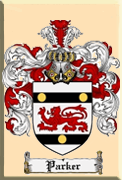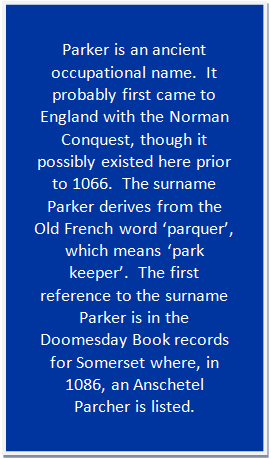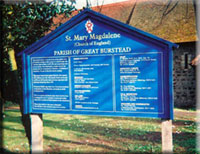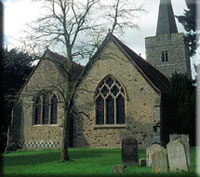Cindy's Genealogy Project


Parker
When I began researching this line of the Parker family, I read many accounts about their bravery and prestige in the communities they lived in. Their exploits were impressive, often glossed over as if their lives were privileged and comfortable. After further research, however, I found this to not be the case. The reality was that they worked very hard in the most inhospitable surroundings and persevered in the most difficult and sometimes brutal situations. The constant hardships and pain they endured would set them apart from most individuals. Their lives are well documented and begin when the Colonies were new and expanding during the "Great Puritan Migration".
Before I begin the accounting of the Parkers, I feel the need to give a brief description of the religious and political climate of that era in order to account for the motivations and actions taken by the family. They held strong religious beliefs which influenced their extreme actions taken to preserve their right to live a humbled life dedicated to God. Seventeenth century England found itself in a precarious religious state with the Protestants in control of the Church and the Catholics trying to regain control over the monarchy.
The Protestant King, Charles I who reigned from 1625-1649, did not help matters between the religious factions. He believed in the "Divine Rights of Kings". This meant that he believed he was chosen by God to be the King of England and he did not have to answer to anyone, including Parliament. The struggle for power between the King and Parliament ended when Charles ignored Parliament altogether and ruled with absolute power. The King took it upon himself to spend money freely and raise taxes to pay for his extravagances. He also created mistrust and resentment in the religious community by marrying a Catholic princess, Henrietta Marie of France, and appointing William Laud as the Archbishop of Canterbury.
During this time, much of the population was becoming more literate and free-thinking after the Reformation hit Europe in the 1500’s. With this new found literacy, the people were forming and sharing new ideas on how better to worship. The Puritans did not want to worship through the restrictions of the Church of England, which they thought were too closely aligned with Catholicism, but to worship by the Word of God through the Bible itself. They did not want to separate from the church, only to purify its practices. The Archbishop of Canterbury, on the other hand, was determined to unify the Church of England his way and wanted all subjects to worship according to the Church of England’s doctrines. Those who did not conform would often risk punishment.
Puritans were not willing to adapt or hide their practices and decided to relocate to the "New World" when the Massachusetts Bay Company was given the go ahead by the King to set up a new colony in New England. Many stories about the harsh, brutal life of the Pilgrims in Plymouth and the Jamestown Colonies were spreading throughout the country. Moving to the unknown land of New England meant that they would have to sell everything, except what was needed for the trip, and say goodbye to family, friends, and neighbors and leave behind a fairly comfortable life that took many generations to forge. They would also have had to procure special licenses to travel out of England.
The great Puritan Migration lasted from 1629-1643 and over 21,000 people made the arduous trip across the ocean to settle in the unknown, unsettled land of the Massachusetts Bay Colony. The sea journey took about 10 weeks in cramped and uncomfortable conditions. The average cost for the trip was around 10 pounds per person and another 30 plus pounds for supplies and live stock the traveler’s were encouraged to bring in order to set-up their homestead in the New World. Seasickness, homesickness, dysentery, poor food made for an uncomfortable journey on the unpredictable Atlantic crossing.
The Parker brothers set out under such conditions from great Burstead, Essex County, England. John, James, Abraham, Joseph, Jacob, along with their cousin Thomas, were men of some means. In the early stages of the Massachusetts Bay Colony, only the pious, fairly well off and educated citizens were chosen to embark onto the New World. They landed in Boston in 1634. Since Boston was already well established, the Parker brothers became part of a new wave of people to cross the Charles River and settle in Charlestown. Being very young men not quite ready to be wholly accepted into the church, they worked hard to establish their place in the Puritan community.


St. Mary Magdalene Church in Burstead, Essex, England was where the Parker family went to worship (www.burstead-church.co.uk).
With the influx of new immigrants to the Massachusetts Bay Colony, new land was needed to accommodate the new arrivals. Charlestown Village, later renamed Woburn, was granted the rights to form a new sister community with Charlestown. Woburn was situated west of Charlestown and was on the cutting edge of the frontier with nothing but forests to greet the new arrivals. The settlers had to carve out their existence from scratch without the benefit of any previously established roads, farmland, meadows, food, or shelter. The brothers were some of the first to settle in Woburn in 1640 and were motivated by their desire to become full members of the church and establish their own homesteads. They were also some of the first taxpayers.
In order to succeed in their endeavor, they would first need to become accepted in the church as freemen. To become a freeman, a commoner had to establish himself into a community and demonstrate his faith and willingness to live and abide by all the strictures governing the community. Once accepted as a productive member of society, he was then subjected to intense questioning and scrutiny on his faith and place in the religious order. After taking an oath of obedience, the selectmen of the church would then vote a man in as a freeman. Becoming a freeman would mean full acceptance into the church, land ownership, and participation in the governing body. The freemen were a minority and only comprised about one fifth of the adult population and were in general the most substantial citizens.
 Back to Top.
Back to Top.
Contact Us | Copyright
Total number of visitors:
Copyright © 2026 HoosierDaddyGenealogy.com.
Design by FreeWebTemplates.me.


